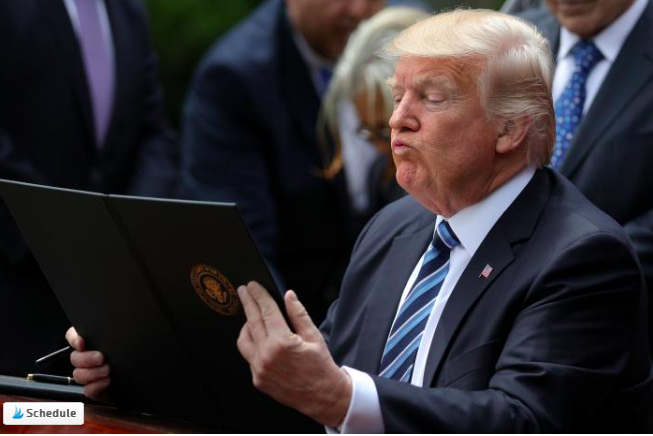World Relief has broken ranks. Will other evangelical organisations follow and criticise Trump?

It's a statistic that has become so familiar I could quote it in my sleep. But it's still surprising. Eighty-one per cent of white evangelicals voted for Trump in 2016.
That's more than voted for George W Bush, with his story of personal conversion and his winning soundbite during the 2000 campaign that Jesus was his favourite philosopher. It's more than voted for Ronald Reagan – the man who re-invented conservatism. It's more than voted for Jimmy Carter – the man who didn't just talk the evangelical talk but even taught Sunday school.
The evangelical support for Trump wasn't just astonishing because of his track record of owning casinos, boasting of assaulting a woman and other things completely antithetical to evangelical morality. It was also surprising because he quite clearly had no concept of what was actually involved in being a Christian.
He said he'd never asked for forgiveness, which isn't just a minor technical point, it's basically a pre-requisite of accepting the gospel.
Of course, the reasons for Trump's triumph among white evangelicals have been carefully analysed in the months since November. Legitimate questions over Hillary Clinton's suitability were obvious – and Trump's decision to appoint a conservative justice to the Supreme Court had the desired effect. Most evangelical leaders either backed Trump, or stayed quiet.
His most enthusiastic cheerleaders were dyed-in-the-wool evangelicals, such as Jerry Falwell Junior, who defended Trump in the face of various indiscretions, Robert Jeffress and Eric Metaxas.
A couple of prominent evangelicals from conservatives like Russell Moore to liberals like Jim Wallis denounced Trump – and significant female leaders such as Beth Moore also spoke out. Most, though, stayed quiet and their flock voted with the Trump cheerleaders.
Now, though, maybe a corner is being turned. As Christian Today reported this morning, a major evangelical organisation has launched an attack on a new immigration plan backed by President Trump.
World Relief issued a statement after Trump offered his support for the RAISE Act which would cut the number of legal migrants into the USA by up to 50 per cent. Although the statement itslef didn't mention Trump, it was clear that World Relief was standing in opposition to the act, which is seen as a key part of Trump's agenda.
CEO Tim Breene said: 'The notion of severely limiting legal immigration goes against the historic American values of freedom and opportunity.'
The criticism didn't end there, though. Speaking about the act's provisions to reduce the number of refugees allowed in to the country, World Relief's president Scott Arbeiter had his say. 'When a nation of immigrants and refugees forsakes its past, it gives up its future,' he said. 'We cannot lose the heart of compassion that gave so many of our own grandparents hope and refuge.
This very strongly worded intervention comes not from a group of liberals, not from Democrats or from the mainstream media. It comes from World Relief, which was founded in 1944 by the National Association of Evangelicals. This is a solidly evangelical organisation which doesn't exist to score political points, but to help vulnerable people. This statement won't have been made lightly.
The stinging critique of Trump's agenda from this well-respected and non-partisan organisation feels as though it may be a turning point.
Trump will always retain the support of true believers such as Falwell, who seem to value fealty to the Republican Party above all else. But for those who've previously kept quiet, this could be the beginning of them finding their voices.
The likes of Russell Moore took heavy criticism from Trump's support base for sticking to their guns and opposing him, but as the chaos of the White house has been laid bare, surely many more are beginning to question their whole-hearted support, or at least their silence in the face of the on-going soap opera at 1600 Pennsylvania Avenue?
Until recently, white evangelical approval of Trump was holding at around 75 per cent. This was despite an overall approval rating of just 34 per cent.
Can that hold up? As the appointment of a pro-life Supreme Court justice fades in memory somewhat and as more evangelical leaders put their heads above the parapet, then maybe.
Immigration and refugee issues are, of course, right at the centre of the concerns of the Bible. If World Relief has kicked off a period of introspection among evangelicals who prize their devotion to Scripture so highly, then things could be about to change.
It's hard to predict, though. Who'd have thought he'd end up with more white evangelical supporters than any other candidate? Who'd have thought they'd stick by him? The future is hard to predict, but just maybe the sands are shifting in the world of evangelcialism.
Follow Andy Walton on Twitter @waltonandy











